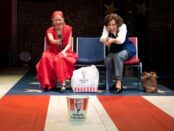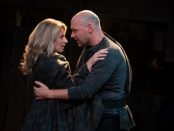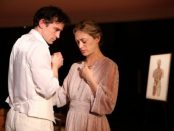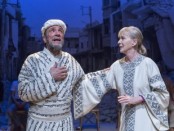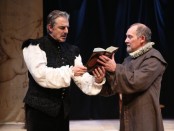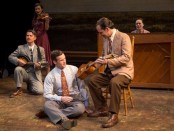The Merchant of Venice (Arlekin Players Theatre)
There is much rewriting and updating plus uncalled for interpolation like speeches from 'Romeo and Juliet" for Jessica and one of Shakespeare’s sonnets (“My Mistress’ eyes are nothing like the sun") as a rap for Lorenzo added to Act V, Scene 1. The play begins with T.R. Knight on mike as the host of “The Antonio Show” and then he sits behind a desk as the merchant of Venice, and interviews his friend Bassanio seated on a sofa as though this was The Tonight Show. With only eight actors, there are not enough to play all of the parts despite doubling, so that Antonio uses two red hand puppets to stand in for his colleagues Salarino and Salanio. [more]



